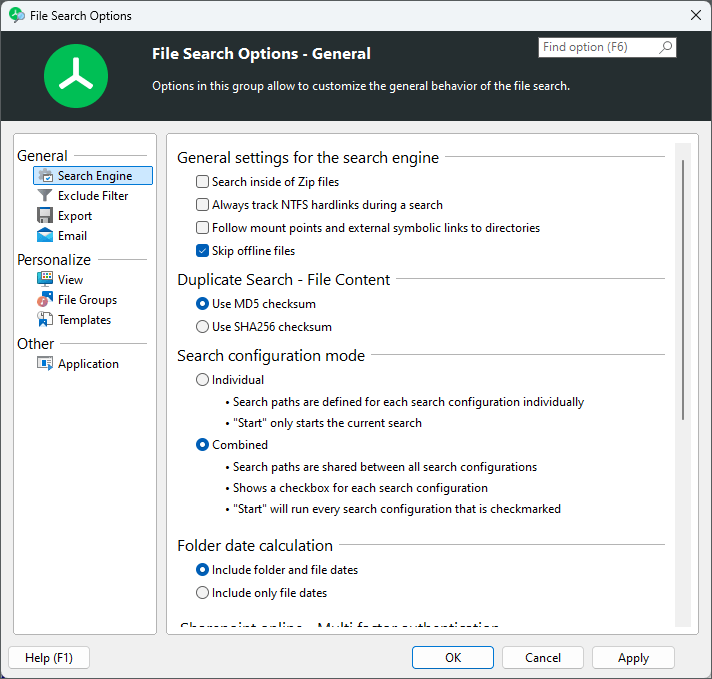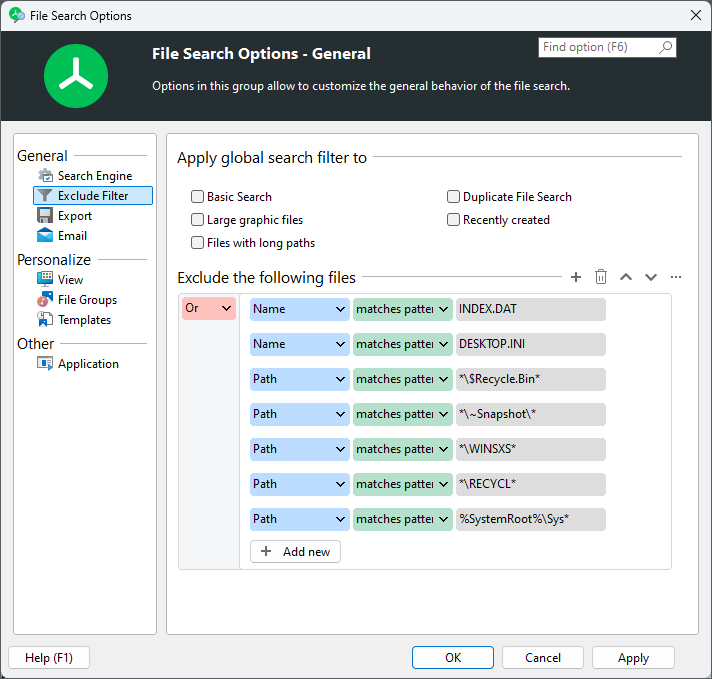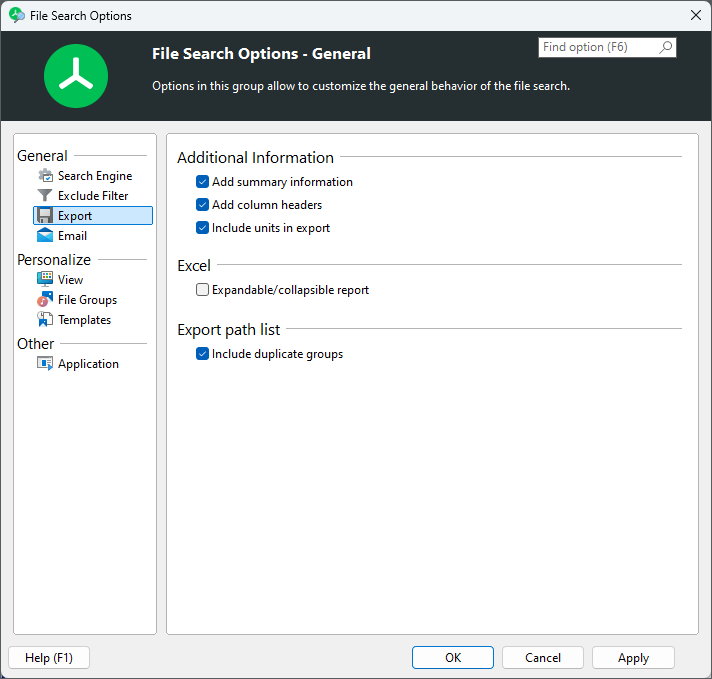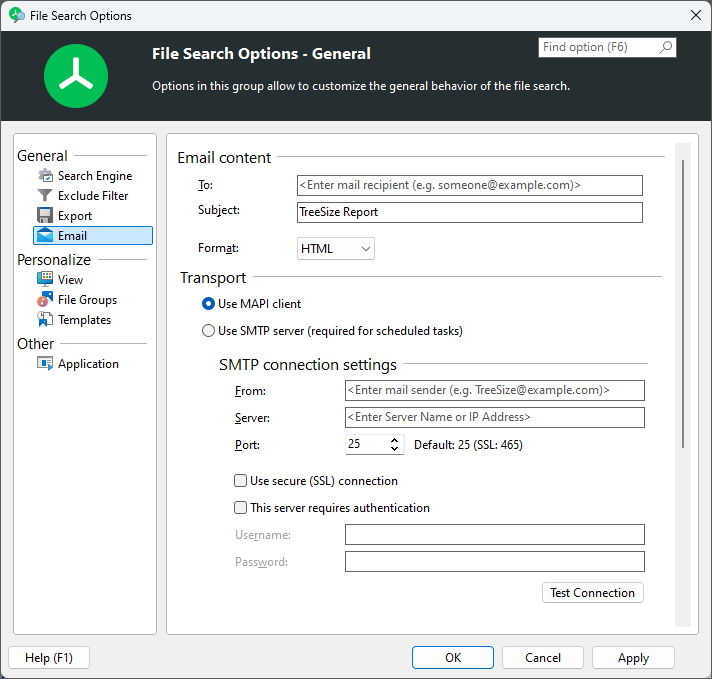General options¶
Search Engine¶

Follow mount points and external symbolic links to directories¶
You can decide if TreeSize should follow symbolic links and mount points (see Notes on NTFS for additional information) that point to other drives or folders on other drives.
Links that point within the scanned directory will never be followed in order to prevent circular references and folders from being counted twice.
Skip offline files¶
Certain search types, such as the duplicates search via MD5-checksum, or the custom search for file content, accesses the content of a file.
This would trigger the download of offline files, which is not intended in most cases. Activate this option, to prevent this.
Exclude Filter¶

The file search was designed to identify obsolete or very large files in order to clean up a system.
Certain files like system files, however, should not be deleted because they are needed by the operating system or other software.
Files known to be important for a system can be added to the exclude list here and will then not be shown in the results any more.
Apply global search filter to¶
Select which of your searches should use the exclude filter. You can select for each of your searches individually, whether or not it should use the filters, or not.
Exclude the following files¶
This option allows you to define exclude filters which will be used when searching for files . Each file/ folder will be compared against the filters and will not listed in the result list, if it matches. This can be used, for instance, to prevent system files from showing up in the result list. It can also be used to hide certain elements that are not relevant for your search.
Note
These filters will only be applied to the searches that are checked above. You can also enable and disable the filters by activating the corresponding option (“Use exclude filter”) in the ribbon menu.
How to define an exclude filter¶
To define a new filter, please follow these steps:
Click the “+” button. An entry will be created in the filters list for the new filter.
- Define the filter:
The most common type of filter is a simple “Full Path” filter. Select “Full Path” in the first selection box and “starts with” in the second one. Enter a path such as “C:\Program Files” to filter all files and folders within that path.
To exclude a groups of files, such as “System files”, select “File type” in the first selection box and the look for the corresponding group in the third.
You can also use Wildcard patterns such as
*.exe, or Regular Expression patterns such as.+\.exe$. Please make sure that you select “matches pattern” / “matches regular expression” in the second selector of the filter definition.
Tip
New files or folders can also be easily added to this list using the right-click menu of the result lists (“Permanently exclude from search results”).
Export¶

Additional information¶
You can specify the amount of additional header information that is included in exports of the file search.
Add summary information¶
Activate this option to include a short summary of the search into the export. This summary contains the path(s) that were processed, the date/time of the search, and the number and size of files and folders that were found.
Add column headers¶
If this option is set, TreeSize will include a row that displays the names of the columns, in addition to the actual search results.
Include units in export¶
If this options is activated, units like “KB”, “MB”, or “%” will be included in the exported data. Uncheck this option, if you want to export plain values.
Excel¶
Expandable/&collapsible report
A dynamic Excel report will be created in which items with subitems, such as duplicate groups, can be expanded/collapsed just like in the result list.
Export path list¶
Include duplicate groups
This option allows the export of duplicate search results via “File > List of paths > Export path list”. If this option is enabled, TreeSize will include the group structure of the duplicate search, when generating a list of files. This allows importing a previously performed duplicate search, without the need to perform the search again.
Email¶

Configure email settings for TreeSize File Search.
Email content¶
To¶
The email address the report will be sent to.
Subject¶
The subject of the email. Supports environment variables such as %DATE%, %TIME% or %USERNAME%.
Format¶
Choose an email format here.
Transport¶
Use MAPI client¶
If this setting is checked, TreeSize will use the local MAPI client (for example Microsoft Outlook) for sending mails.
Use SMTP server¶
TreeSize will use the specified SMTP server to send email reports. Please make sure to test the connection settings before applying the current options.
Note
You will have to enter valid SMTP settings in order to make use of email reports in scheduled scan or search tasks or all other kinds of automated starts (e.g. batch programs or command line calls) (Professional Edition only).
From
The email address that will be shown as the sender of the report.
Server
The name (DNS) or IP address of the machine hosting the SMTP service through which messages are to be sent.
Port
The port on which the SMTP service specified in the “Server” field is listening for connections.
Use secure (SSL) connection
Indicates that Secure Sockets Layer (SSL) should be used when sending messages via SMTP.
This server requires authentication
Select this option if SMTP service specified by the Server field requires authentication. Passwords will be encrypted before storing them in the TreeSize settings file.
Test Connection
Test the SMTP connection settings. This will send a test email to the email address specified in the “To” field.
Email body¶
Include results in mail body¶
Results will be added to the body of the email. NOTE: For very bigger reports, this can lead to very large mails, which can take a very long time to open in mail clients, or even exceed mail server limitations.
Attach a report with the results¶
Adds the result report as attachment to the email. This fixes the problem of very large emails that can occur with the other option.
Exported lists¶
Active list / all lists¶
Select which search result lists shall be included in the email : only the currently active search types or all search types.
Exported elements¶
Checked items / all items in the list
Select here, if you want to have just the checked/marked result list entries or all entries from the result list included in the email report.